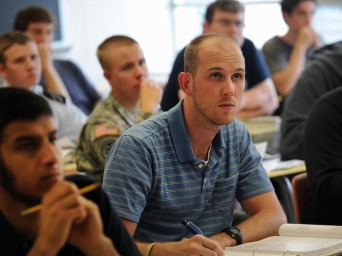 When AnnaBelle Bryan decided to finish college after leaving military service, she thought the process would be easy. After all, the government is supposed to pay some or all of veterans’ tuition costs.
When AnnaBelle Bryan decided to finish college after leaving military service, she thought the process would be easy. After all, the government is supposed to pay some or all of veterans’ tuition costs.
by Arnaldo Rodgers
But that was before the university she was attending, South University, incorrectly told the Veterans’ Administration that she was going to school part-time, she said. The VA responded by paying only half of the tuition benefit she should have received, a difference of about $800.
It’s not as if the Bryans don’t know how to deal with the VA: AnnaBelle Bryan is the research manager of the National Center for Veterans Studies at the University of Utah, and her husband Craig is its executive director. Craig Bryan called the VA, but was told that since the error was in the system, nothing could be done.
“They never resolved the thing,” Bryan said. “It was just lost benefits.” And it happened more than once. All told, he estimates the couple lost over $2,000 to the errors.
When Congress passed the Post-9/11 Veterans Educational Assistance Act in 2008, the goal was to extend military educational benefits to more recent veterans. On paper it does exactly that. But veterans report numerous difficulties actually making use of the funds.
Some of the most serious problems appear to be with for-profit colleges, not all of which are accredited. A number of for-profit colleges aggressively recruit veterans: a report prepared by the majority staff of the Senate Health, Education, Labor and Pensions committee found that eight of the top 10 entities receiving funds from the Post-9/11 GI Bill were companies operating for-profit colleges or universities.
And tuition at these for-profit colleges often exceeds the benefit veterans are eligible for, so some wind up taking out student loans, something that was supposed to be avoidable under the bill.
Even veterans who do not go to for-profit colleges can run into problems with their tuition bills. Matthew Boulay, the executive director of the Veterans’ Student Loan Relief Fund, an organization that provides financial aid to veterans who have taken on excessive debt to attend for profit schools, is one.
Boulay is enrolled in a doctoral program at Teachers College, Columbia University. He received a tuition bill from Columbia this fall—while he was completing the VA paperwork that would go through Columbia to receive the tuition reimbursement. (Colleges and universities have to certify to the VA that veterans are enrolled.)
In Boulay’s case, he said, Columbia agreed to sit tight until the VA covered its share of his tuition bill. But that doesn’t always happen.
Some schools (often for-profit colleges) “pressure veterans to pay out of pocket,” Boulay said. “Or they offer a student veteran a loan, sometimes at outrageous rates, basically making money.”
When schools start with the pressure, veterans can run into bigger problems, Craig Bryan said. “To pay tuition, they take money from an account here or there and then suddenly they can’t pay rent. Then they lose the apartment, then drop out of school, and then the VA says ‘OK, you don’t get the benefit’ and they are without income.”
Bryan does not have data on the prevalence of this phenomenon, but he believes it is disturbingly widespread. “We’ve worked with universities across the country. These are the stories we have heard,” he said.
Robert Muth, the supervising attorney at the Veterans’ Legal Clinic at the University of San Diego School of Law, said many veterans have come to his clinic seeking help with these problems. Sometimes the issue relates to tuition payments through other programs, like the tuition assistance available to active duty service members, he said. But veterans using the GI Bill funds also report problems.
Very commonly, Muth said, veterans report being told they have to fill out a federal request for financial aid–even when they may not need it.
“A number of veterans come in and say that they [were told they] have to fill out the form as part of the application process, and then they have all these debts in their name,” he said. “It is very common that they will be presented with a stack of documents with sticky notes saying ‘sign here’ and they assume someone is just helping them and they have no idea what they are signing.” Ultimately, he said, “the individual will take on all this debt, more than they would ever need.”
Certainly there are institutions that treat student veterans much more gently. Matt Randle, chief operating officer of Student Veterans of America, said that his university had a policy that allowed veterans eligible for GI Bill funds to get a hold on their account until the the VA paid up.
And if the VA did not supply stipends for books and the like on time, students were allowed to go to the bookstore and buy what they needed with a promissory note. They could even get a cost of living loan at no interest until the VA supplied those funds.
“There are many, many schools doing things just like that,” he said. “Obviously, a school that is demanding payment upfront because there is a bureaucratic process is obviously not following industry best practice. It’s not the standard, and it’s not operating with the student veteran’s educational experience in mind.”
There are efforts underway to help veterans choose schools that work well with GI Bill beneficiaries. The Department of Veterans’ Affairs in early November issued the latest iteration of its GI Bill Comparison Tool, for example. The VA is also planning to start accumulating feedback on different schools that veterans can access.
These advances can’t come soon enough for some veterans. AnnaBelle Bryan is already thinking about pursuing a doctorate in clinical psychology.
“Después de retirarse de la Fuerza Aérea, traté de hacer lo retiro”, dijo.”Eso no duró mucho tiempo en absoluto.”
All content herein is owned by author exclusively. Expressed opinions are NOT necessarily the views of VNR, authors, affiliates, advertisers, sponsors, partners, technicians, or VT Network. Some content may be satirical in nature.
All images within are full responsibility of the author and NOT VNR.
Read Full Policy Notice - Comment Policy





























